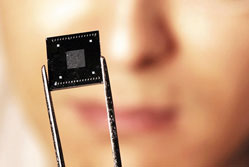 영어토론방 영어토론방 | Home>영어토론방 |
Economy Intel slapped with W26b fine for fair trade violat
페이지 정보

본문
 Korea's antitrust watchdog yesterday slapped Intel Corp., the world's largest maker of computer chips, with a fine of 26 billion won ($25.42 million) for violating local fair trade regulations.
Korea's antitrust watchdog yesterday slapped Intel Corp., the world's largest maker of computer chips, with a fine of 26 billion won ($25.42 million) for violating local fair trade regulations. The Fair Trade Commission ruled that the U.S. chip giant abused its market dominance in computer processing chips to squeeze out a competitor from the market by giving rebates to local PC makers.
"Intel excluded rival Advanced Micro Devices Inc. by providing rebates to local PC makers Samsung Electronics Co. and Trigem Computer Inc., on condition that they didn't buy chips from ADM," it said in an e-mailed statement.
Intel said it was considering an appeal, arguing that what the commission determined as anticompetitive practice was part of a legitimate joint marketing effort between the chipmaker and PC manufacturers that use its CPUs.
"We will thoroughly study the FTC's decision and, if deemed necessary, will take a legal action," the firm said in response to the FTC's decision.
Intel has been running the famous "Intel Inside" co-branding program around the globe in which it gives "market-development funds" to computer makers if they highlight the Intel brand on their machines, on packaging, and in marketing.
The FTC claimed that Intel gave a total of $30 million in the so-called loyalty rebates and market development funds to Samsung Electronics, the country's largest PC maker, and $7.5 million to the second-largest, Trigem, between late 2002 and mid-2005.
Between 2001 and 2005, Intel's share of the global CPU market stood at 79.6 percent, with that of the Korean market was 91.3 percent.
In Europe and the United States, Intel faces accusations by its Silicon Valley neighbor AMD that it uses its grip on central processing units -- the brain of personal computers -- to choke off competition. U.S. and European regulators are currently looking into the accusations, while Japan issued an official warning, without fines, to the firm for what it called the anticompetitive practice of Intel in 2005.
The 26 billion won fine is the second-largest amount that the Korean regulator has imposed on a multinational tech firm. In 2005, the commission ordered U.S. software giant Microsoft Corp. to pay 32.4 billion won in fines for bundling instant messenger and media player programs with its flagship Windows operating system.
The FTC is also investigating another U.S. firm, Qualcomm, on accusations that it abused its monopoly power in wireless technology to demand excessive royalties and block fair competition.
By Lee Sun-young (milaya@heraldm.com)
Question
1. Market dominance can have some negative effects on market.
Please give some examples of them.
2. What else we can find now as an example of market dominance?
3. In Korea, the market dominance of KT&G is another issue.
Have you ever heard of this phenomenon and how do you think about it?
4. Most of Korean public corporations are becoming under the private management.
But the dominant status on market of those corporations is quite severe.
How can we solve these problems?
이 글은「대학연합영어토론동아리」www.pioneerclub.com에서 제공하는 영어토론 정보입니다.
댓글목록

한강쏘주팔이님의 댓글
한강쏘주팔이 작성일#1. Two forms of "market dominance" are monopoly and oligopoly. These kinds of market dominance can be bad not only to the market, but also to society as a whole. That is, if a company takes dominance on the supply of inelastic goods, such as oil, there is a high possibility that the company charges unreasonable prices for the goods, and yet the consumers still have to pay the money because the products are necessities. In that case, such market dominance can cause an increase in interest rates, which in turn can causes inflation.

